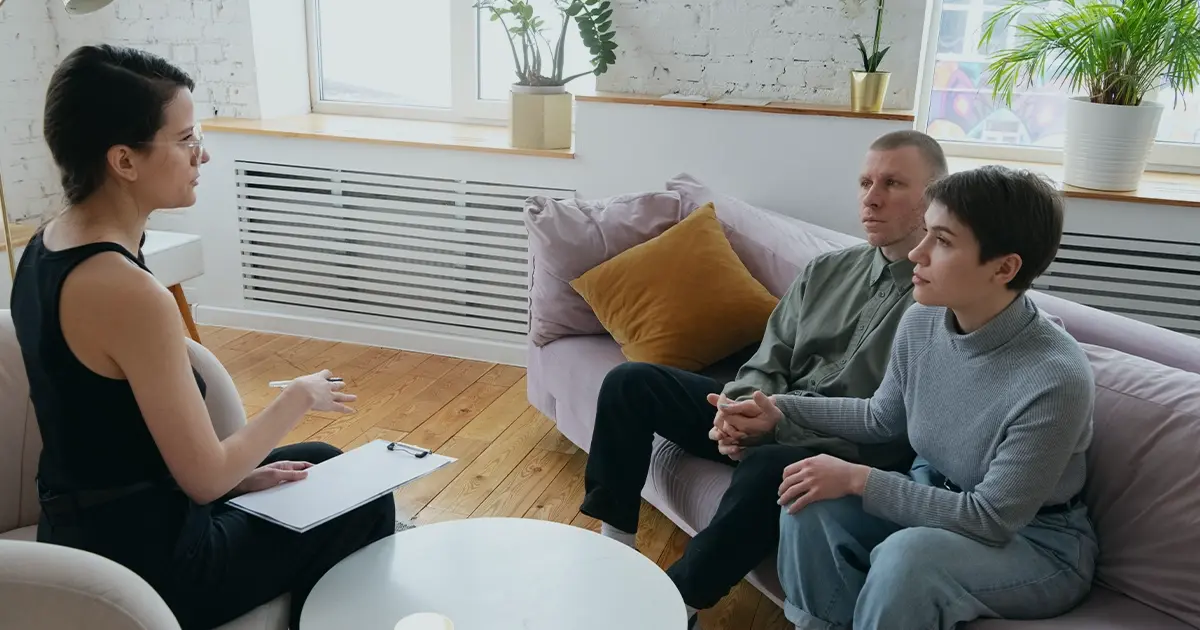Relationships are an integral part of our lives, offering emotional support, companionship, and love. However, maintaining healthy relationships can be challenging, and conflicts are inevitable. Whether you’re in a romantic partnership, a family dynamic, or navigating friendships, relationship issues are something everyone faces at some point. The good news is that therapy can be an incredibly effective tool for resolving conflicts, improving communication, and strengthening bonds.
At Nurturing Wellness, we believe that therapy offers transformative benefits for individuals and couples seeking to improve their relationships. In this blog post, we’ll explore how therapy can help with relationship issues, the types of relationship therapy available, and the benefits of seeking professional support for your relationships.
How Therapy Can Help with Relationship Issues:
Therapy provides a safe and structured space to address underlying issues in relationships. Whether it’s poor communication, unresolved conflicts, trust issues, or emotional disconnect, therapy helps individuals and couples work through challenges in a healthy and productive way. Here are some ways therapy can help with relationship issues:
1. Improving Communication:
One of the most common sources of conflict in relationships is poor communication. Misunderstandings, unexpressed emotions, and different communication styles can lead to frustration and tension. In therapy, individuals or couples learn how to communicate more effectively, express their needs and feelings clearly, and listen actively to one another.
Therapists teach communication skills that promote understanding and empathy, helping partners feel heard and valued. These skills can be beneficial not only in romantic relationships but also in family dynamics, friendships, and work relationships.
2. Resolving Conflicts:
Disagreements are a natural part of any relationship, but how those disagreements are handled makes all the difference. In therapy, individuals or couples learn conflict-resolution techniques that prevent arguments from escalating into destructive behaviors.
A therapist can help partners identify the root causes of conflicts and teach strategies to address disagreements in a calm, respectful, and solution-oriented manner. This can include learning how to compromise, finding common ground, and understanding each other’s perspectives.
3. Strengthening Emotional Connection:
Over time, relationships can experience emotional disconnection, where individuals feel distant, neglected, or misunderstood. Therapy helps partners reconnect by fostering emotional intimacy and understanding. In a safe environment, couples can express their feelings, fears, and desires without judgment.
Therapists guide individuals in rediscovering the emotional bond that may have been lost over time, encouraging vulnerability, affection, and support. Strengthening emotional connections helps rebuild trust and reinforces the foundation of a healthy relationship.
4. Addressing Trust Issues:
Trust is the cornerstone of any relationship. Unfortunately, trust can be damaged due to infidelity, dishonesty, or betrayal. When trust issues arise, therapy can play a crucial role in rebuilding that trust.
In therapy, individuals or couples work through the pain caused by broken trust and learn how to rebuild it. Therapists help partners identify the underlying causes of mistrust, facilitate open and honest conversations, and establish strategies to regain trust over time.
5. Navigating Life Transitions:
Life transitions, such as moving in together, marriage, having children, career changes, or dealing with the loss of a loved one, can bring about stress and strain in relationships. Therapy helps individuals and couples navigate these changes with better communication and coping strategies.
Therapists provide support during these transitions, offering guidance on how to manage stress and balance the demands of life. Therapy helps individuals adjust to new roles and expectations while maintaining a healthy and supportive relationship.
6. Healing from Past Trauma:
Past trauma can have a profound impact on relationships. Whether it’s childhood trauma, past abuse, or unresolved emotional wounds, these experiences can affect how individuals interact in their current relationships. Therapy provides a safe space to address and heal from past trauma, allowing individuals to build healthier and more fulfilling relationships.
Therapists work with clients to process painful memories, release emotional baggage, and develop coping mechanisms that prevent past trauma from influencing present-day relationships. Therapy also helps individuals set healthy boundaries and foster positive patterns of behavior.
Types of Therapy for Relationship Issues:
Several therapeutic approaches are available to help with relationship issues, depending on the nature of the problem and the needs of the individuals involved. Here are some common types of therapy used to address relationship challenges:
1. Couples Therapy:
Couples therapy, also known as marriage counseling or relationship therapy, is specifically designed to help romantic partners navigate conflicts, improve communication, and strengthen their relationship. A therapist works with both partners to address their concerns, understand each other’s perspectives, and create strategies for resolving issues.
Couples therapy is beneficial for relationships of all stages, from dating and cohabiting couples to married partners. It’s also helpful for couples dealing with specific challenges like infidelity, intimacy issues, or major life changes.
2. Family Therapy:
Family therapy involves working with family members to improve communication, resolve conflicts, and address dysfunctional dynamics. Whether it’s a disagreement between siblings, parent-child conflicts, or dealing with family trauma, family therapy provides a safe space for everyone to express their feelings and work through challenges together.
A family therapist helps facilitate conversations, set healthy boundaries, and encourage empathy among family members. Family therapy can be especially helpful when family issues are affecting the overall well-being of the household.
3. Individual Therapy for Relationship Issues:
Sometimes, relationship issues stem from personal struggles, such as low self-esteem, anxiety, or unresolved past trauma. In such cases, individual therapy can help address these underlying issues and improve an individual’s ability to relate to others.
Through individual therapy, individuals can work on building self-awareness, developing healthier coping strategies, and addressing personal challenges that may be affecting their relationships. Individual therapy can be a valuable first step in improving relationship dynamics and fostering personal growth.
4. Cognitive Behavioral Therapy (CBT):
Cognitive Behavioral Therapy (CBT) is a popular therapeutic approach that helps individuals identify and change negative thought patterns and behaviors. In the context of relationships, CBT can be used to address unhelpful thinking patterns that lead to conflicts or emotional distance between partners.
CBT helps individuals challenge distorted beliefs, such as “I’m not worthy of love” or “My partner doesn’t care about me,” and replace them with healthier, more constructive thoughts. This can significantly improve communication, emotional connection, and overall relationship satisfaction.
When Should You Seek Therapy for Relationship Issues?
It’s common for relationships to experience ups and downs, and it’s natural to have disagreements from time to time. However, if you’re experiencing ongoing issues that are affecting your emotional well-being or causing distress, therapy can be a valuable resource. Here are some signs it might be time to seek therapy:
- Constant arguments or communication breakdowns
- A lack of emotional intimacy or connection
- Difficulty resolving conflicts or finding compromise
- Trust issues or infidelity
- Feeling stuck in the relationship or unsure of its future
- Personal issues that are impacting the relationship, such as stress, anxiety, or trauma
Seeking therapy doesn’t mean your relationship is doomed—it means that you’re taking proactive steps to improve communication, heal from past wounds, and strengthen your connection.
Conclusion:
Therapy is an invaluable tool for addressing and resolving relationship issues. Whether you’re struggling with communication problems, trust issues, or navigating life transitions, therapy offers support, guidance, and practical tools for creating healthier, more fulfilling relationships. By seeking help from a skilled therapist, you can overcome challenges, deepen emotional connections, and build stronger, more resilient relationships.
At Nurturing Wellness, we offer relationship therapy services tailored to your unique needs. Whether you’re in a romantic partnership, a family dynamic, or dealing with personal struggles affecting your relationships, we are here to help you heal and grow. Reach out to us today to start your journey toward healthier relationships.





